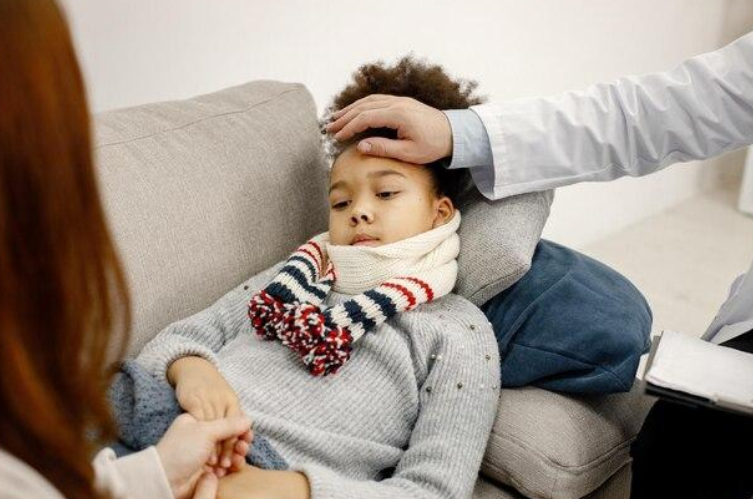When your child complains of a sore throat, it’s easy to hope it’s just a minor irritation that will resolve on its own. However, sometimes, what seems minor can be a sign of something more serious. Recognizing when a sore throat could be a signal of a significant health issue is crucial to ensuring your child gets the right care at the right time.

Most sore throats are caused by common viruses and resolve without medical intervention, but others require a closer look by a healthcare professional. This article will help you understand which symptoms demand a doctor’s visit, ensuring you’re equipped to take the best action for your child’s health.
So, without any further ado, let’s begin!
When to Seek Medical Advice for Your Child’s Sore Throat
Here are some signs that your child’s sore throat could be more serious than a simple cold:
Persistence: If the sore throat lasts more than a few days, it’s time to consider that it might not just be a common cold. Persistent sore throats could be a sign of a bacterial infection, such as strep throat, which might require antibiotics for treatment.
Severe Pain: A sore throat that causes severe pain, especially if it suddenly worsens, should be evaluated by a healthcare professional. This can be an indicator of more serious conditions like tonsillitis or an abscess, which can impair swallowing and even breathing.
Accompanied by Other Symptoms: If the sore throat is accompanied by a fever, rash, joint pain, or swollen lymph nodes, these are red flags. Such symptoms could indicate a viral infection like mononucleosis or even something more severe that needs immediate attention.
Difficulty Breathing or Swallowing: This is an urgent symptom. If your child is struggling to breathe or swallow, it indicates that the throat swelling might be significant or there might be an obstruction that needs quick medical intervention.
Signs of Dehydration: Look for signs of dehydration, such as a dry mouth, lack of tears, less frequent urination, or unusually dark urine. Children may become dehydrated if swallowing becomes too painful, leading to reduced fluid intake.
When noticing any of these symptoms, it’s advisable to contact your pediatrician or seek a specialist. You can ask other moms for advice or look online for ENT specialists at Southern ENT or nearby. This helps you find a reachable specialist with excellent medical skills and advanced treatment options for your child.
How To Find the Right Pediatric Doctor For Your Child
- Choose a pediatrician whose office is conveniently located and offers flexible hours to accommodate your schedule.
- Visit the office to make sure it’s child-friendly and welcoming, which is important for putting your child at ease.
- Select a doctor who communicates clearly and listens attentively to your concerns, making sure you understand your child’s health and treatment options.
- Confirm the pediatrician’s availability for emergencies, including how to get advice outside of regular office hours.
- Make sure the pediatrician accepts your health insurance to avoid unexpected medical bills.
Preventive Tips
To help prevent common health issues and maintain your child’s overall well-being, consider these preventive tips. However, it’s important to remember that these measures do not replace professional medical advice. Always prioritize consultations with healthcare professionals as your first step in your child’s health care:
Regular Check-Ups: Schedule routine appointments with your healthcare provider to monitor your overall well-being and address any concerns early on. Vaccinations protect against serious diseases and help prevent their spread within the community. By staying up-to-date on vaccinations and attending regular check-ups, you’re taking proactive steps to safeguard your health and the health of those around you.
Healthy Diet: Offer a nutritious diet consisting of fruits, vegetables, whole grains, and lean proteins. This balanced diet supports growth and strengthens the immune system, helping to ward off illnesses. Encourage healthy eating habits from a young age to establish a lifelong foundation for good health.
Hygiene Practices: Start by demonstrating proper handwashing techniques and encourage them to wash their hands regularly. Show them how to cover their mouth and nose when coughing or sneezing to prevent the spread of germs.
Safe Environment: Childproofing your home and providing careful supervision are key strategies to avoid accidents. Install safety gates, outlet covers, and cabinet locks to prevent access to potentially dangerous areas or items. Keep small objects, choking hazards, and sharp objects out of reach. Regularly inspect the home for potential hazards and address them promptly.
Wrapping Up
As a parent, trust your instincts and seek professional advice if your child’s condition persists or worsens. Remember, a sore throat can be a manifestation of an underlying condition, and proper diagnosis is key to effective treatment. By being proactive and working closely with healthcare professionals, you can ensure your child receives the care they need, enabling a swift recovery and a return to their vibrant, healthy selves.



